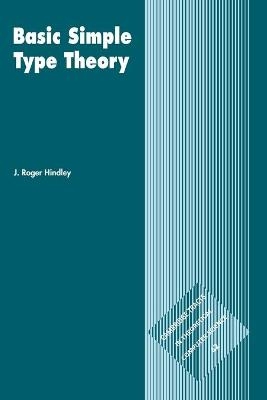
Basic Simple Type Theory
Seiten
2008
Cambridge University Press (Verlag)
978-0-521-05422-5 (ISBN)
Cambridge University Press (Verlag)
978-0-521-05422-5 (ISBN)
This book introduces and teaches the techniques of type theory by focusing on one particularly neat system and studying it in detail. In this way, all the key ideas are covered without getting involved in the complications of more advanced systems, but concentrating rather on the principles that make the theory work in practice.
Type theory is one of the most important tools in the design of higher-level programming languages, such as ML. This book introduces and teaches its techniques by focusing on one particularly neat system and studying it in detail. In this way, all the key ideas are covered without getting involved in the complications of more advanced systems, but concentrating rather on the principles that make the theory work in practice. This book takes a type-assignment approach to type theory, and the system considered is the simplest polymorphic one. The author covers all the basic ideas, including the system's relation to propositional logic, and gives a careful treatment of the type-checking algorithm which lies at the heart of every such system. Also featured are two other interesting algorithms that have been buried in inaccessible technical literature. The mathematical presentation is rigorous but clear, making the book at a level which can be used as an introduction to type theory for computer scientists.
Type theory is one of the most important tools in the design of higher-level programming languages, such as ML. This book introduces and teaches its techniques by focusing on one particularly neat system and studying it in detail. In this way, all the key ideas are covered without getting involved in the complications of more advanced systems, but concentrating rather on the principles that make the theory work in practice. This book takes a type-assignment approach to type theory, and the system considered is the simplest polymorphic one. The author covers all the basic ideas, including the system's relation to propositional logic, and gives a careful treatment of the type-checking algorithm which lies at the heart of every such system. Also featured are two other interesting algorithms that have been buried in inaccessible technical literature. The mathematical presentation is rigorous but clear, making the book at a level which can be used as an introduction to type theory for computer scientists.
Introduction; 1. The type-free λ-calculus; 2. Assigning types to terms; 3. The principal-type algorithm; 4. Type assignment with equality; 5. A version using typed terms; 6. The correspondence with implication; 7. The converse principal-type algorithm; 8. Counting a type's inhabitants; 9. Technical details; Answers to starred exercises; Bibliography; Table of principal types; Index.
| Erscheint lt. Verlag | 21.1.2008 |
|---|---|
| Reihe/Serie | Cambridge Tracts in Theoretical Computer Science |
| Zusatzinfo | 1 Tables, unspecified; 10 Line drawings, unspecified |
| Verlagsort | Cambridge |
| Sprache | englisch |
| Maße | 151 x 228 mm |
| Gewicht | 310 g |
| Themenwelt | Mathematik / Informatik ► Informatik ► Theorie / Studium |
| Mathematik / Informatik ► Mathematik ► Logik / Mengenlehre | |
| ISBN-10 | 0-521-05422-2 / 0521054222 |
| ISBN-13 | 978-0-521-05422-5 / 9780521054225 |
| Zustand | Neuware |
| Haben Sie eine Frage zum Produkt? |
Mehr entdecken
aus dem Bereich
aus dem Bereich
was jeder über Informatik wissen sollte
Buch | Softcover (2024)
Springer Vieweg (Verlag)
CHF 53,15
Grundlagen – Anwendungen – Perspektiven
Buch | Softcover (2022)
Springer Vieweg (Verlag)
CHF 48,95
Eine Einführung in die Systemtheorie
Buch | Softcover (2022)
UTB (Verlag)
CHF 34,95


